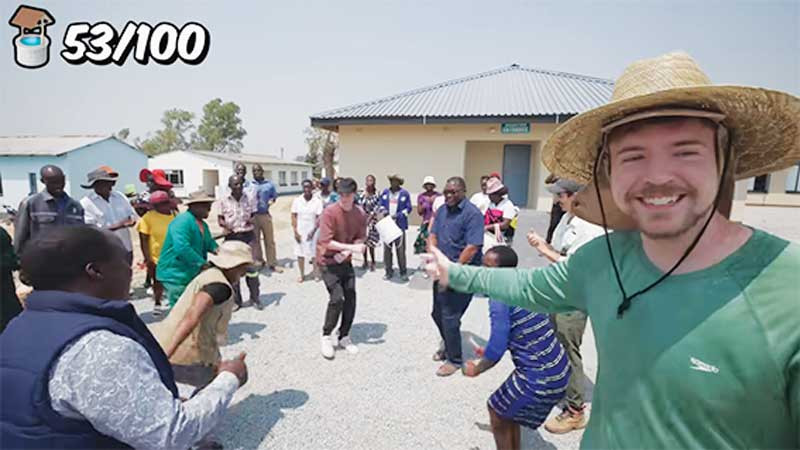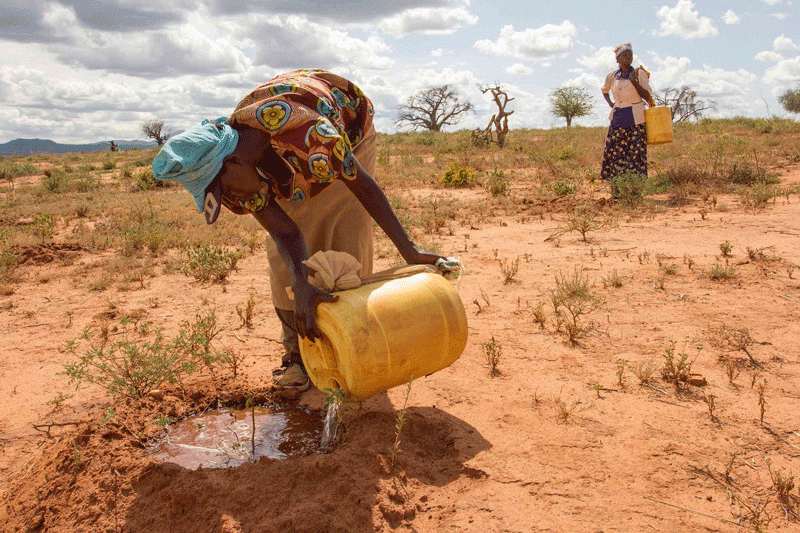
AS women and girls bear the brunt of an unravelling global water and sanitation crisis, Zimbabwe continues to search for its own solution to alleviate the challenge.
And in such hard times when the entire world is grappling with the crisis, assistance can be far between.
But when help pops up literally out of the blues, one can only rejoice as what happened when a good Samaritan from America came to the rescue of some of the country’s villagers in dire need of water.
With Zimbabwe struggling to contain an endemic cholera outbreak, the arrival of American YouTuber, philanthropist and entrepreneur Jimmy “MrBeast” Donaldson helped save many lives.
Although his philanthropic work in Zimbabwe of drilling boreholes as part of his project to provide fresh water for disadvantaged communities in Africa was hardly celebrated locally, it left a lasting mark on the communities whose lives he touched in Zimunya, Manicaland province, and Shurugwi in the Midland province, where he drilled a borehole and donated bicycles, respectively.

For the women and girls using Tongogara clinic the solar-powered borehole was a real shot in the arm and a step ahead of the 2,2 billion people across the globe struggling to access safe drinking water.
According to a United Nations Children’s Fund and the World Health Organisation report published this year in July women are most likely to be responsible for fetching water for households, and girls are nearly twice as likely as boys.
- American Youtuber extends benevolence to Zim
- The power to stop gender-based violence
- Zim, AU partner to eliminate GBV
- Empower, excel: Accelerating action for female leaders in the digital realm
Keep Reading

Women and girls travel long trips to fetch water, causing them to lose out on education, work, and leisure time.
They also face risks of physical injury and dangers from wildlife on the way.
A United Nations survey in 177 countries pointed out that women spend an estimated 40 billion hours in a year collecting water, which has incapacitated their efforts to engage in other productive and reproductive activities.
MrBeast, who dropped out of East Carolina University to pursue a full-time YouTube career, is regarded as the biggest YouTuber across the globe with over 200 million subscribers on his main channel and a top earner, making it a bonus for the lucky local communities he helps.
Now the Zimunya and Shurugwi communities are also trending on the video sharing and social media platform YouTube headquartered in San Bruno, California in the United States, which began in 2005 as a simple video-hosting platform through which anyone, professional or amateur, could upload and share video content.
The 25-year-old MrBeast runs a variety of other YouTube channels, including Beast Reacts, MrBeast Gaming, MrBeast Shorts and versions of these in a range of languages.
Through Jellysmack, he is also present on other social media platforms.
According to various estimates including Celebrity Net Worth, Yahoo Finance and Forbes analysis, the Kansas-born creator rakes in between US$3 to US$5 million each month via a combination of adverts revenue and paid sponsorships by various brands, such as Microsoft and Electronic Arts.
It is estimated that MrBeast’s 2021 YouTube earned US$54 million, averaging US$4,5 million per month, via the platform which makes him not only the biggest, but also one of the highest-paid YouTubers.
Other estimates place MrBeas,t who is said to have begun his tenure on YouTube in 2012 when he was only 13 years, at about US$500 million net worth.
Along with other YouTubers and influencers, MrBeast has created massive worldwide fundraising campaigns dedicated to environmental goals like planting trees and removing waste from the oceans.
Early this month, he flew into Zimbabwe from Kenya on his philanthropic work mission that also saw him donating books and computers to some local schools.
He posted a video on his YouTube channel confirming his visit to Zimbabwe where he commissioned a solar-powered boreholes at Tongogara polyclinic.
In the same video, he revealed that he has drilled 100 boreholes in five African countries namely: Kenya, Zimbabwe, Uganda, Somalia and Cameroon.
MrBeast said his goal was to help over half a million people access clean water.
“We have been in Africa for over a week and we still have a lot more wells to do. First on the agenda (in Zimbabwe) was to check out a local hospital (Tongogara Polyclinic) that was in need of clean water upon entering, we learned how big of an impact this clinic had on the village,” he said.
“How many kids do you guys give birth to here?” MrBeast asked a nurse when he visited Tongogara polyclinic.
“In a month, about 50 kids,” she replied.
Thanks to MrBeast the pregnant mothers at the clinic no longer have to walk the nearly two-kilometre journey to fetch water.
They now have water at the clinic.
MrBeast later, during his visit, donated some bicycles to pupils at Chitora Primary School in Zimunya, near Mutare city.
“Besides ensuring access to clean water, a lot of the students at this village lack transportation so we decided to give all of them new bicycles. I know it looks like a lot of kids, but we bought a lot of bikes,” he noted.
“After giving away the bikes we continue building solar powered wells specially designed to aid the farmers in this village by providing more than enough water for all of their crops and livestock.
“Even during the dry season, without any electricity, each panel is 200 watts, then pumps 5 000 litres every hour. Basically, it is an unlimited amount of water for this entire village. That is incredible.”
Mr Beast said he wants to continue to give water to communities all across Africa and was set to build more deep wells in Uganda, Somalia and Cameroon.







